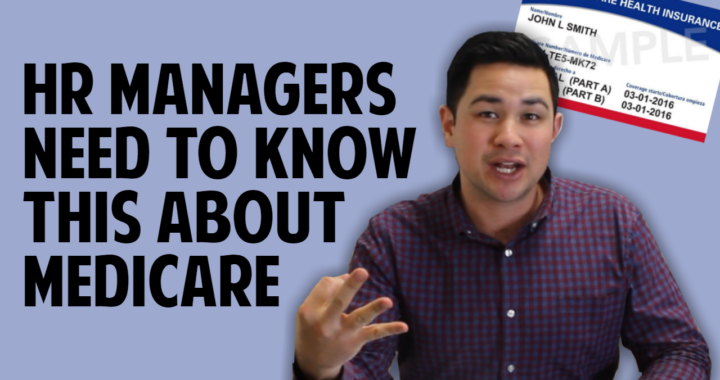HR and Benefits Mangers get tons of questions about Medicare. How do we know?
We talk to HR and Benefits Managers all the time because they get approached by employees looking for direction on what to do about Medicare. Answering those questions can be difficult as Medicare is outside the scope of what HR and Benefits are usually involved with.
The thing is that many Americans are choosing to work past age 65 and that means staying on group employer insurance and delaying their Medicare benefits. According to the Bureau of Labor Statistics, 36 percent of 65-to-69-year-olds will be part of the labor force by 2024.
There are a lot of myths and misconceptions out there about Medicare and possible penalties and traps that people can fall into.
It’s important to know some simple things about Medicare that can make you an even greater resource for the employees of your company and keep them out of Medicare trouble. Here are three things to know:
1) What is Medicare and what are the different parts?
Medicare is the federal health insurance program for
- People who are 65 or older
- Certain younger people with disabilities
- People with End-Stage Renal Disease (permanent kidney failure requiring dialysis or a transplant, sometimes called ESRD)
There are four parts to Medicare. Only two of them are part of Original Medicare which are Part A and Part B.
Part A, which is inpatient hospital coverage and skilled nursing. It grants you access to any hospital or skilled nursing facility anywhere in the U.S that contracts with Medicare. There is no cost to be enrolled into Part A for most people, however there are still out-of-pocket costs involved in Part A.
Side note, I have a Medicare 101 video here that you can watch and I go more in depth into the different parts of Medicare.
Then there’s Part B which covers all the out-patient services like: doctors, specialists, x-ray, lab, diagnostic, preventative, physical therapy, chemo, radiation, outpatient surgeries, ambulance trips, etc. Part B does have a cost to it which starts at $135.50/mo in 2019. Part B gives complete nationwide access to any provider that contracts and accepts Medicare assignment. But once again there are still out of pocket costs involved with part B as well.
Part A and Part B make up Original Medicare…these are the benefits people get from paying that Medicare tax their entire working careers.
Part C and D we will cover briefly because for the most part these only apply once someone is enrolled into both parts of Original Medicare.
Many times, if someone is still employed and has group employer insurance they may be able to delay parts of their Medicare.
Part C is called Medicare Advantage. This is a separate way that someone can take their Medicare benefits. What happens here is that private insurance companies take the place of your Original Medicare benefits and provide your health care and health insurance needs all inside one plan. They are government subsidized plans.
Part D of Medicare is the prescription drug coverage.
2) Do your employees need to enroll into Medicare if they are continuing to work?
There are two criteria that I ask everyone that calls me who still has employer group insurance. One…does your employer have 20 or more employees? Two…is your current insurance considered creditable coverage? If they answer yes to both, they can continue on their employer group insurance and they have the option to enroll into Part A of Medicare, which would go secondary to their employer group plan. Then we would suggest that they opt out of Part B until they decide to retire. Part B does have a cost to it, so most people decide to delay it if they have that group employer plan.
There are no penalties or restrictions if someone has delayed their Part B because they’ve been on the employer group insurance and met the two criteria from above. They will have what’s called a Special Enrollment Period to get back enrolled into Part B or both A and B at a future date.
Also, if an employee’s group health plan is a Health Savings Account, they will not want to enroll into either Part A or Part B and they will want to double check that their current insurance is “creditable coverage.” There could be tax penalties for enrolling into any parts of Medicare if you have contributed to a Health Savings Account within 6 months of your enrollment into Medicare but not earlier then the 65th birthday month. Ask your tax professional for specifics on HSA’s and Medicare.
3) How and when should a retiree get enrolled into Part B of Medicare?
Here is how that process looks.
Let’s say we have Joe…he currently works at the school district…and he’s turning 68 and finally going to hang up the cleats.
At age 65, Joe enrolled into Part A but opted out of Part B because he had employer insurance.
Now that he is retiring, he will be losing his employer coverage.
He’s not sure what to do so he calls Elliott.
Here’s what I would tell him.
Well Joe, first you’ll need to enroll into Part B which you can do up to three months before you need it effective.
You will have to have two forms completed.
A Former Employer Verification form signed off by HR or Benefits. This is how you will avoid late enrollment penalties.
And you will also need a Part B Enrollment form which you can complete on your own. On the bottom in the remarks section write down which month you would like your medicare Part B to be effective.
We suggest, the first of the month after your employer insurance ends.
Once you have those two forms completed, I would suggest walking them into a local social security office. We’ve had people mail the forms in, only to get lost or returned due to incomplete paperwork.
Then once you have that in process, we can discuss what type of policies you would like to add on from there to cover the “gaps” in Original Medicare.
There is a grace period for retirees to enroll into Part B after they have retired but we don’t suggest it. We usually suggest having all your Medicare plans start at the same time as soon as your employer coverage ends.
So those are the three things that every HR Manager should know about Medicare.
My dad, Ray Martin and I put on Medicare 101 presentations for School Districts, County and State Government Organizations and Corporations all around California and people are always so grateful for the information.
So if you are an HR manager and think your employees would benefit from a Medicare 101 educational workshop, feel free to give us a call at 800-464-4941 or email me at elliott@WeRetireSmart.com.
We’d be glad to do it and of course at no cost.
If you would like more information on Medicare, request a copy of The Nuts & Bolts of Medicare book here and we will mail it out to you!
Thanks for reading!



I enjoyed reading the article above, it explains everything in detail, the article is very interesting and effective. Thank you and good luck with the upcoming articles.